Module 4 Healthy food Unit 3 Language in use 课件 (26张PPT)
文档属性
| 名称 | Module 4 Healthy food Unit 3 Language in use 课件 (26张PPT) | 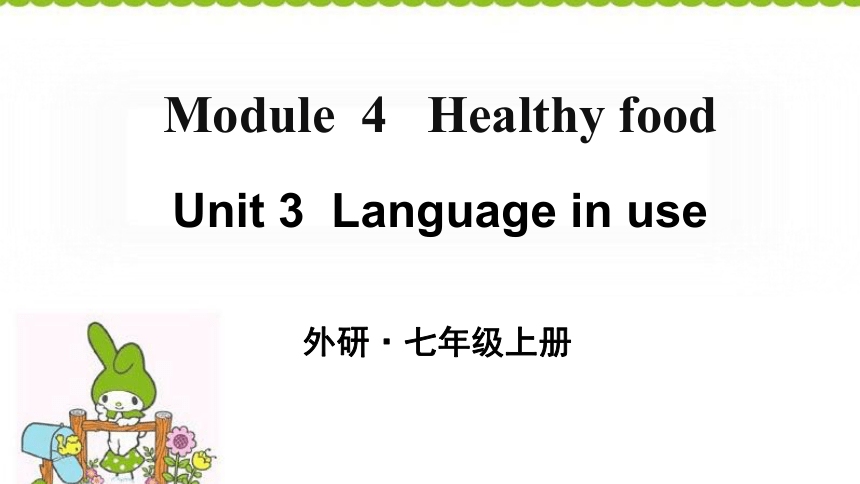 | |
| 格式 | ppt | ||
| 文件大小 | 3.3MB | ||
| 资源类型 | 试卷 | ||
| 版本资源 | 外研版 | ||
| 科目 | 英语 | ||
| 更新时间 | 2020-07-25 22:00:22 | ||
图片预览

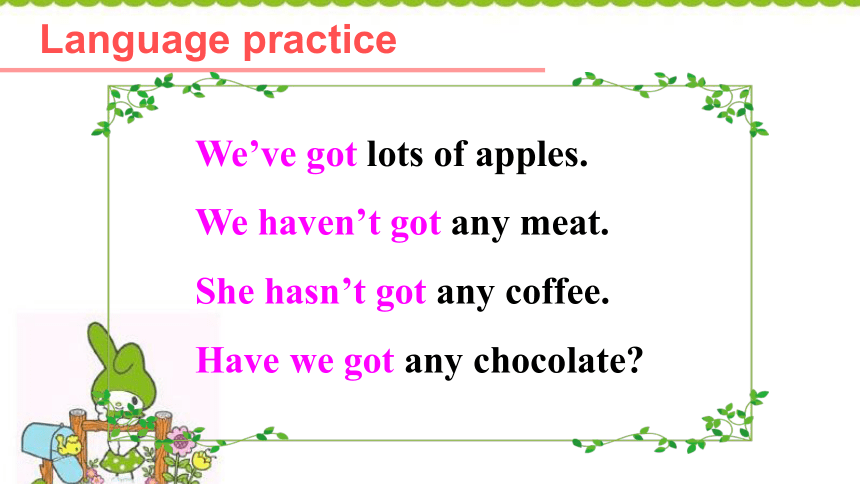
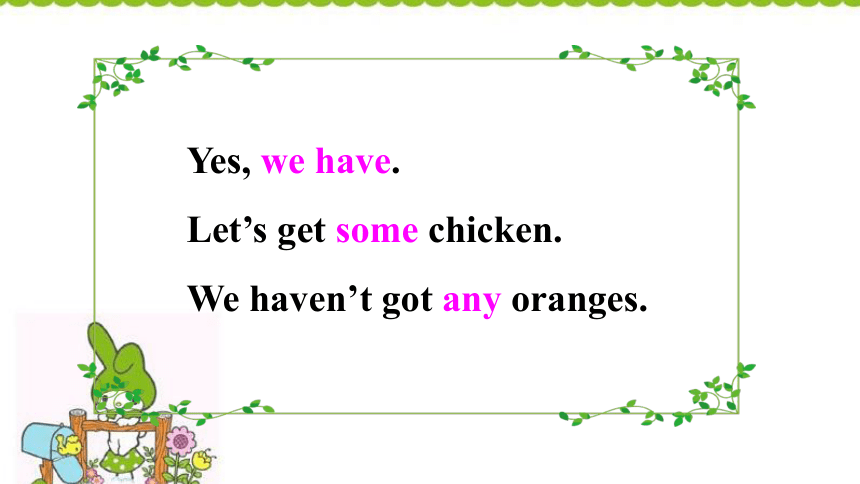
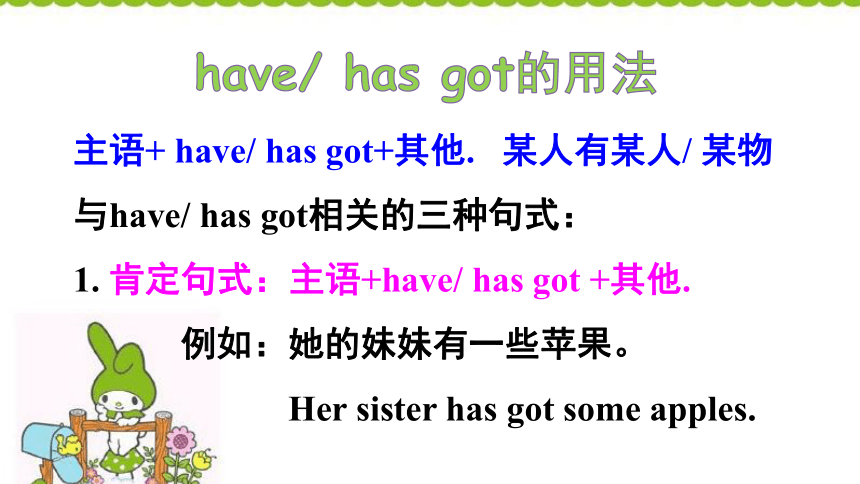
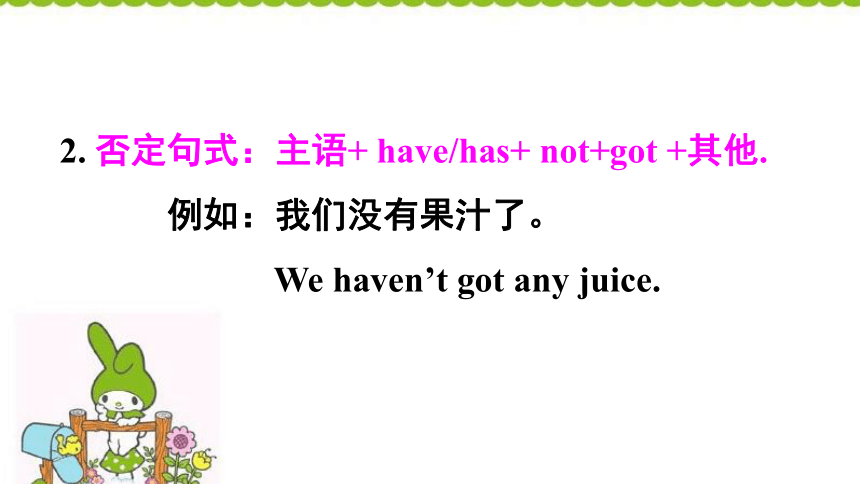
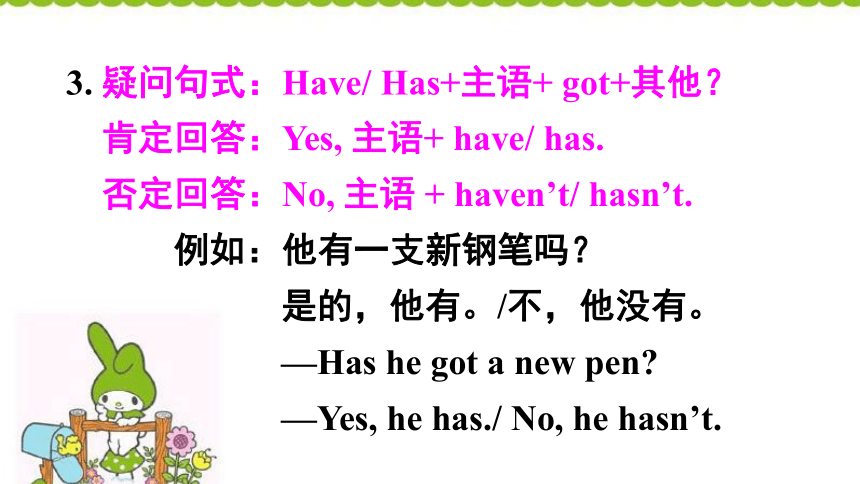
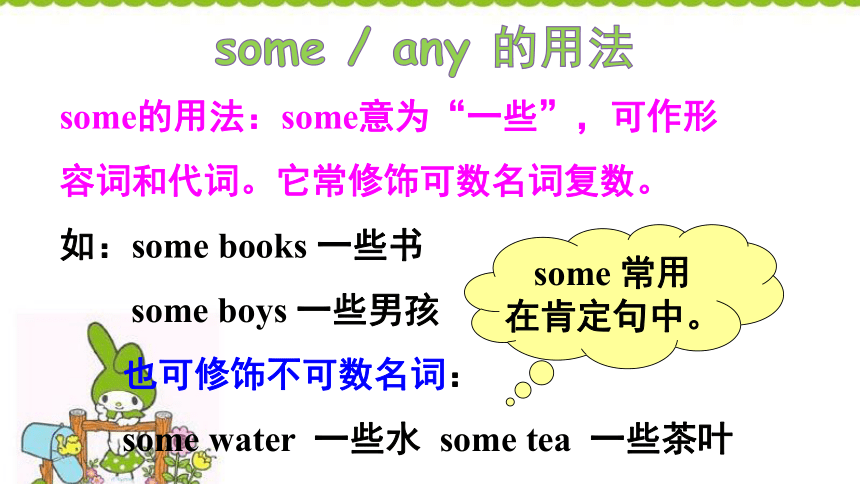

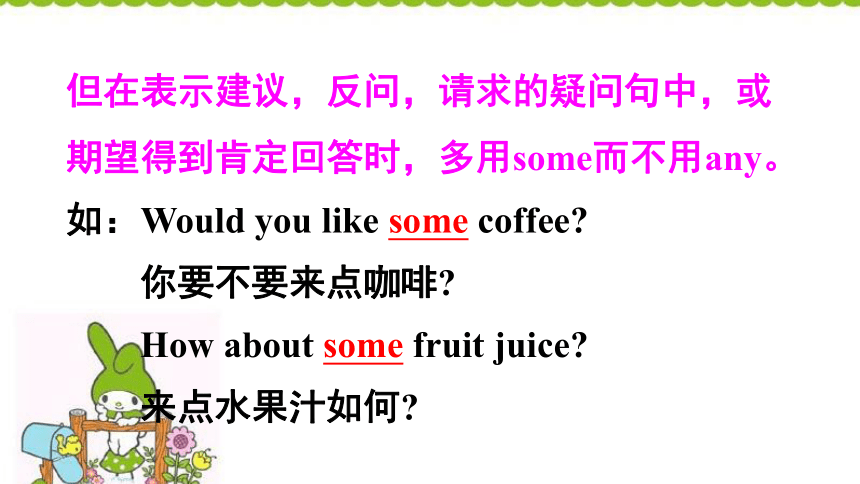
文档简介
外研·七年级上册
Unit 3 Language in use
Module 4 Healthy food
Language practice
We’ve?got?lots?of?apples.
We?haven’t?got?any?meat.
She?hasn’t?got?any?coffee.
Have?we?got?any?chocolate?
Yes, we?have.
Let’s?get?some?chicken.
We?haven’t?got?any?oranges.
主语+ have/ has got+其他. 某人有某人/ 某物
与have/ has got相关的三种句式:
1. 肯定句式:主语+have/ has got +其他.
例如:她的妹妹有一些苹果。
Her sister has got some apples.
2. 否定句式:主语+ have/has+ not+got +其他.
例如:我们没有果汁了。
We haven’t got any juice.
3. 疑问句式:Have/ Has+主语+ got+其他?
肯定回答:Yes, 主语+ have/ has.
否定回答:No, 主语 + haven’t/ hasn’t.
例如:他有一支新钢笔吗?
是的,他有。/不,他没有。
—Has he got a new pen?
—Yes, he has./ No, he hasn’t.
some的用法:some意为“一些”,可作形
容词和代词。它常修饰可数名词复数。
如:some books 一些书
some boys 一些男孩
也可修饰不可数名词:
some water 一些水 some tea 一些茶叶
some 常用在肯定句中。
any的用法:any意为“任何一些”,它也可修饰可数名词复数或不可数名词,常用于疑问句和否定句。
如:I can’t see any tea. 我没看见茶叶。
Do you have any friends at school?
你在学校有些朋友吗?
但在表示建议,反问,请求的疑问句中,或
期望得到肯定回答时,多用some而不用any。
如:Would you like some coffee?
你要不要来点咖啡?
How about some fruit juice?
来点水果汁如何?
当any表示“任何”的意义,起强调作用时,
它可以用在肯定句中。
如:Any student can answer this question.
任何学生都可以回答这个问题。
Work in pairs. Look at the picture and talk about the food in the fridge.
1
— Have we got any…?
—Yes, we have.
/ No, we haven’t.
Now write about the food in the fridge.
We’ve got some meat.
We haven’t got any fish.
1 ________________ vegetables.
2 _________________ orange.
3 _________________ apples.
We have got some
We haven’t got any
We haven’t got any
4 _________________ eggs.
5 _________________ bananas.
6 _________________ orange
juice.
7 _________________ milk.
We haven’t got any
We have got some
We have got some
We have got some
Look at the picture and talk about it.
2
apple
hamburger
orange
potato
tomato
apples
hamburgers
oranges
potatoes
tomatoes
fish meat rice milk
juice chicken water
可数名词:
(1) 定义:是可以计数的名词
(2) 可数名词前可以用a, an限定,表示一个……
(3) 可数名词前可以用one, two, three…限定。
(4) 可数名词有复数形式。
可数名词和不可数名词
一般在名词词尾加-s
map maps 地图 apple apples 苹果
以s, x, ch,sh结尾的名词后加-es
box boxes 盒子 watch watches 手表
(1) 规则变化
以f 或fe 结尾的名词,多数变f 或fe 为v 再加-es
leaf leaves 树叶 knife knives 小刀
以“辅音字母+-y”结尾的名词,变 y为 i再加-es
party parties 聚会 story stories 故事
以o结尾的名词在词尾加-es或-s
potato potatoes 土豆 photo photos 照片
变内部元音字母
man men 男人 woman women 女人
foot feet 脚 tooth teeth 牙齿
完全不规则
child children 孩子 mouse mice 老鼠
单复数同形
sheep deer Chinese Japanese
(2) 不规则变化
(1)不可数名词前不能用a(an)修饰,表示特指
时,前面一定要用定冠词the。
(2)不可数名词作主语时,谓语动词要用单数
形式,但是不可数名词前有复数“单位词”
时,谓语动词要用复数形式。
例如:There are three bottles of milk on
the table.
不可数名词
He has got some / a(n)…
He hasn’t got any…
She has got some / a(n)…
She hasn’t got any…
They have got some / a(n)…
They haven’t got any…
Complete the word map.
3
vegetables
fruit
healthy
food
favourite
food
food
healthy
drink
favourite
drink
meat
drink
carrots
tomatoes
bananas
apples
oranges
ice cream
beef
juice
water
milk
milk
beef
chicken
fish
potatoes
tea
Complete the sentences with the correct form of the words from the box.
4
bit delicious important remember stay
1 ___________ to buy some fruit.
2 It’s _____________ to eat healthy food.
3 Eat well and _______ healthy.
4 Orange juice is __________. Let’s buy some.
5 I am a ______ tired.
Remember
important
stay
delicious
bit
In the West, for breakfast, people usually eat bread and eggs and drink coffee or tea, milk and fruit juice.
A Western breakfast
Module task: Making a poster about a
healthy breakfast
Work in groups of four or five. Make a poster about a healthy breakfast.
5
Make a list of questions about a healthy breakfast.
Talk to students from another group about a healthy breakfast.
Make a poster about your healthy breakfast.
Present your poster to the class.
6
Choose the best poster.
7
Healthy food
________________
________________
can eat
_________
_________
can’t eat
_________
_________
1. Write a passage about your favourite food, including drink, vegetables, fruit, and so on.
2. Do the exercises.
Unit 3 Language in use
Module 4 Healthy food
Language practice
We’ve?got?lots?of?apples.
We?haven’t?got?any?meat.
She?hasn’t?got?any?coffee.
Have?we?got?any?chocolate?
Yes, we?have.
Let’s?get?some?chicken.
We?haven’t?got?any?oranges.
主语+ have/ has got+其他. 某人有某人/ 某物
与have/ has got相关的三种句式:
1. 肯定句式:主语+have/ has got +其他.
例如:她的妹妹有一些苹果。
Her sister has got some apples.
2. 否定句式:主语+ have/has+ not+got +其他.
例如:我们没有果汁了。
We haven’t got any juice.
3. 疑问句式:Have/ Has+主语+ got+其他?
肯定回答:Yes, 主语+ have/ has.
否定回答:No, 主语 + haven’t/ hasn’t.
例如:他有一支新钢笔吗?
是的,他有。/不,他没有。
—Has he got a new pen?
—Yes, he has./ No, he hasn’t.
some的用法:some意为“一些”,可作形
容词和代词。它常修饰可数名词复数。
如:some books 一些书
some boys 一些男孩
也可修饰不可数名词:
some water 一些水 some tea 一些茶叶
some 常用在肯定句中。
any的用法:any意为“任何一些”,它也可修饰可数名词复数或不可数名词,常用于疑问句和否定句。
如:I can’t see any tea. 我没看见茶叶。
Do you have any friends at school?
你在学校有些朋友吗?
但在表示建议,反问,请求的疑问句中,或
期望得到肯定回答时,多用some而不用any。
如:Would you like some coffee?
你要不要来点咖啡?
How about some fruit juice?
来点水果汁如何?
当any表示“任何”的意义,起强调作用时,
它可以用在肯定句中。
如:Any student can answer this question.
任何学生都可以回答这个问题。
Work in pairs. Look at the picture and talk about the food in the fridge.
1
— Have we got any…?
—Yes, we have.
/ No, we haven’t.
Now write about the food in the fridge.
We’ve got some meat.
We haven’t got any fish.
1 ________________ vegetables.
2 _________________ orange.
3 _________________ apples.
We have got some
We haven’t got any
We haven’t got any
4 _________________ eggs.
5 _________________ bananas.
6 _________________ orange
juice.
7 _________________ milk.
We haven’t got any
We have got some
We have got some
We have got some
Look at the picture and talk about it.
2
apple
hamburger
orange
potato
tomato
apples
hamburgers
oranges
potatoes
tomatoes
fish meat rice milk
juice chicken water
可数名词:
(1) 定义:是可以计数的名词
(2) 可数名词前可以用a, an限定,表示一个……
(3) 可数名词前可以用one, two, three…限定。
(4) 可数名词有复数形式。
可数名词和不可数名词
一般在名词词尾加-s
map maps 地图 apple apples 苹果
以s, x, ch,sh结尾的名词后加-es
box boxes 盒子 watch watches 手表
(1) 规则变化
以f 或fe 结尾的名词,多数变f 或fe 为v 再加-es
leaf leaves 树叶 knife knives 小刀
以“辅音字母+-y”结尾的名词,变 y为 i再加-es
party parties 聚会 story stories 故事
以o结尾的名词在词尾加-es或-s
potato potatoes 土豆 photo photos 照片
变内部元音字母
man men 男人 woman women 女人
foot feet 脚 tooth teeth 牙齿
完全不规则
child children 孩子 mouse mice 老鼠
单复数同形
sheep deer Chinese Japanese
(2) 不规则变化
(1)不可数名词前不能用a(an)修饰,表示特指
时,前面一定要用定冠词the。
(2)不可数名词作主语时,谓语动词要用单数
形式,但是不可数名词前有复数“单位词”
时,谓语动词要用复数形式。
例如:There are three bottles of milk on
the table.
不可数名词
He has got some / a(n)…
He hasn’t got any…
She has got some / a(n)…
She hasn’t got any…
They have got some / a(n)…
They haven’t got any…
Complete the word map.
3
vegetables
fruit
healthy
food
favourite
food
food
healthy
drink
favourite
drink
meat
drink
carrots
tomatoes
bananas
apples
oranges
ice cream
beef
juice
water
milk
milk
beef
chicken
fish
potatoes
tea
Complete the sentences with the correct form of the words from the box.
4
bit delicious important remember stay
1 ___________ to buy some fruit.
2 It’s _____________ to eat healthy food.
3 Eat well and _______ healthy.
4 Orange juice is __________. Let’s buy some.
5 I am a ______ tired.
Remember
important
stay
delicious
bit
In the West, for breakfast, people usually eat bread and eggs and drink coffee or tea, milk and fruit juice.
A Western breakfast
Module task: Making a poster about a
healthy breakfast
Work in groups of four or five. Make a poster about a healthy breakfast.
5
Make a list of questions about a healthy breakfast.
Talk to students from another group about a healthy breakfast.
Make a poster about your healthy breakfast.
Present your poster to the class.
6
Choose the best poster.
7
Healthy food
________________
________________
can eat
_________
_________
can’t eat
_________
_________
1. Write a passage about your favourite food, including drink, vegetables, fruit, and so on.
2. Do the exercises.
同课章节目录
- Starte
- Module 1 My teacher and my friends
- Module 2 My English lesson
- Module 3 My English book
- Module 4 My everyday life
- Module 1 My classmates
- Unit 1 Nice to meet you.
- Unit 2 I'm Wang Lingling and I'm thirteen years ol
- Unit 3 Language in use.
- Module 2 My family
- Unit 1 Is this your mum?
- Unit 2 These are my parents.
- Unit 3 Language in use.
- Module 3 My school
- Unit 1 There are thirty students in my class.
- Unit 2 The library is on the left of the playgroun
- Unit 3 Language in use.
- Module 4 Healthy food
- Unit 1 We've got lots of apples.
- Unit 2 Is your food and drink healthy?
- Unit 3 Language in use.
- Module 5 My school day
- Unit 1 I love history.
- Unit 2 We start work at nine o'clock.
- Unit 3 Language in use.
- Revision module A
- Module 6 A trip to the zoo
- Unit 1 Does it eat meat?
- Unit 2 The tiger lives in Asia.
- Unit 3 Language in use.
- Module 7 Computers
- Unit 1 How do I write my homework on the computer?
- Unit 2 When do you use a computer?
- Unit 3 Language in use.
- Module 8 Choosing presents
- Unit 1 I always like birthday parties.
- Unit 2 She often goes to concerts.
- Unit 3 Language in use.
- Module 9 People and places
- Unit 1 We're enjoying the school trip a lot.
- Unit 2 They're waiting for buses or trains.
- Unit 3 Language in use.
- Module 10 Spring Festival
- Unit 1 Are you getting ready for Spring Festival?
- Unit 2 My mother's cleaning our houses and sweepin
- Unit 3 Language in use.
- Revision module B
